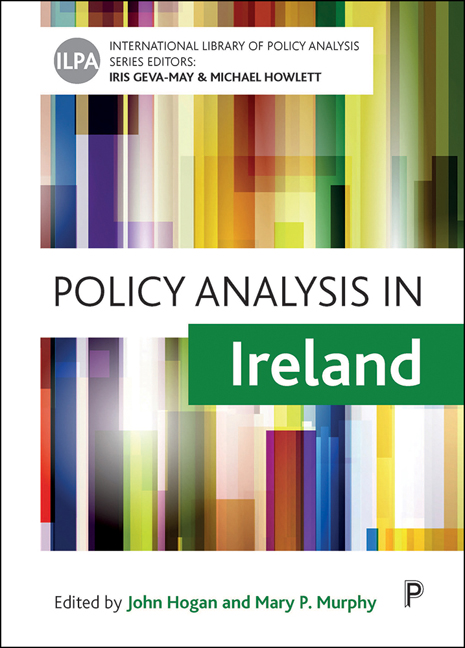Book contents
- Frontmatter
- Contents
- List of figures, tables and boxes
- List of abbreviations
- Notes on contributors
- Editors’ introduction to the series
- Acknowledgements
- Foreword
- Preface
- one Contextualising policy analysis in Ireland
- Part One: History, styles and methods of policy analysis in Ireland
- Part Two: Policy analysis at various levels of government: from local to the EU
- Part Three: Think tanks, interest groups, political parties and gender-based policy analysis
- Part Four: The public, science and the media: the wider policy analysis environment in Ireland
- Index
nine - Europeanised policy making in Ireland
Published online by Cambridge University Press: 18 December 2021
- Frontmatter
- Contents
- List of figures, tables and boxes
- List of abbreviations
- Notes on contributors
- Editors’ introduction to the series
- Acknowledgements
- Foreword
- Preface
- one Contextualising policy analysis in Ireland
- Part One: History, styles and methods of policy analysis in Ireland
- Part Two: Policy analysis at various levels of government: from local to the EU
- Part Three: Think tanks, interest groups, political parties and gender-based policy analysis
- Part Four: The public, science and the media: the wider policy analysis environment in Ireland
- Index
Summary
Introduction
Ireland's decision to join the European Union (EU) on 1 January 1973 constitutes the most important foreign policy decision by the Irish state since its foundation in 1921. Ireland's membership of the EU over a period of near five decades has been punctuated by periods of both volatility and stability: Irish economic fortunes have been mixed, public support for the EU has vacillated, policy developments have sometimes been controversial, structural funds have been welcomed, and social progress has transpired. On balance, membership of the EU has been good for Ireland (Murphy and O’Brennan, 2014). Being part of the EU family has aided Ireland's global positioning and its ability to cope with the demands of international economic competition. EU policy initiatives have sometimes challenged domestic constituencies opposed to change; the civil service and political system have been exposed to new (and better) ways of working and managing common problems; and political elites have acquiesced to EU-inspired models of best practice. Pragmatic engagement with the EU has tended to be the hallmark of the Irish experience (Laffan and Tannam, 1998) and being part of the EU has produced distinct patterns of adaptation and contestation at the domestic Irish level. In other words, the Europeanisation process, as it has played out in Ireland, has produced some (although not always extensive) patterns of convergence with EU approaches, outputs and norms.
In short, EU membership has had an impact on myriad domestic issues, sectors and policies. Since accession, the Irish economy, political system, institutions and policies of the state have been influenced and sometimes challenged – to varying degrees – by a series of diverse Europeanising forces. Importantly, domestic policy changes often have broader implications, since the process of problem solving and the use of policy instruments are invariably linked to the wider legal, political and administrative environment (see Héritier et al, 2001). The Europeanisation of public policy therefore is felt and experienced in tandem with some Europeanisation of institutions, and processes and procedures. The resultant process of Europeanisation has played a part in shaping not just Irish public policy, but also the wider Irish polity since 1973 (O’Brennan, 2012, p 94).
Using a Europeanisation frame, this chapter measures and explains the process of and impact of EU policy analysis in Ireland. The EU context can constrain the policy analysis process.
- Type
- Chapter
- Information
- Policy Analysis in Ireland , pp. 123 - 138Publisher: Bristol University PressPrint publication year: 2021



